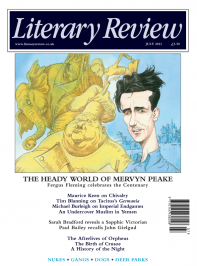Daniel Swift
Anthem For Doomed Youth
Strange Meetings: The Poets of the Great War
By Harry Ricketts
Chatto & Windus 278pp £20
Robert Graves went to fight the First World War with a knapsack full of ‘Keats, Homer, and the novelist Samuel Butler’. Siegfried Sassoon followed, carrying with him ‘Hardy’s The Dynasts, Conrad’s A Set of Six, Charles Lamb’s essays and Chaucer’s Canterbury Tales’, and when they met in a mess in northern France they inevitably talked about books. Harry Ricketts’s admirable new study emphasises the influences shared between the poets of what used to be called ‘the Great War’. These were always poets in company, in the presence of their dead predecessors or, often, their soon-to-be-dead peers.
Strange Meetings is, Ricketts writes, a ‘collective biography’: it sets out fifteen meetings between poets, although his definition of ‘meeting’ is creatively broad. As he notes, ‘eight actually took place, six are near-encounters of various kinds, and one … is faction, fiction closely based on fact’. He opens

Sign Up to our newsletter
Receive free articles, highlights from the archive, news, details of prizes, and much more.@Lit_Review
Follow Literary Review on Twitter
Twitter Feed
It wasn’t until 1825 that Pepys’s diary became available for the first time. How it was eventually decrypted and published is a story of subterfuge and duplicity.
Kate Loveman tells the tale.
Kate Loveman - Publishing Pepys
Kate Loveman: Publishing Pepys
literaryreview.co.uk
Arthur Christopher Benson was a pillar of the Edwardian establishment. He was supremely well connected. As his newly published diaries reveal, he was also riotously indiscreet.
Piers Brendon compares Benson’s journals to others from the 20th century.
Piers Brendon - Land of Dopes & Tories
Piers Brendon: Land of Dopes & Tories - The Benson Diaries: Selections from the Diary of Arthur Christopher Benson by Eamon Duffy & Ronald Hyam (edd)
literaryreview.co.uk
Of the siblings Gwen and Augustus John, it is Augustus who has commanded most attention from collectors and connoisseurs.
Was he really the finer artist, asks Tanya Harrod, or is it time Gwen emerged from her brother’s shadow?
Tanya Harrod - Cut from the Same Canvas
Tanya Harrod: Cut from the Same Canvas - Artists, Siblings, Visionaries: The Lives and Loves of Gwen and Augustus John by Judith Mackrell
literaryreview.co.uk